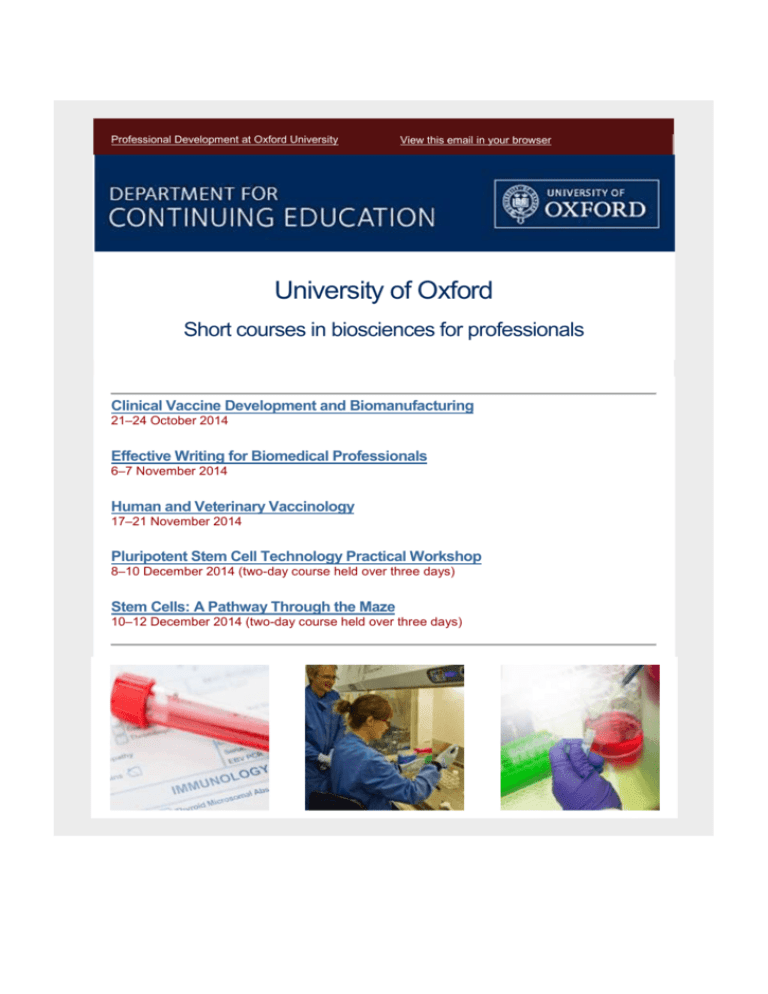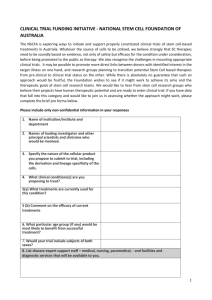
Professional Development at Oxford University
View this email in your browser
University of Oxford
Short courses in biosciences for professionals
Clinical Vaccine Development and Biomanufacturing
21–24 October 2014
Effective Writing for Biomedical Professionals
6–7 November 2014
Human and Veterinary Vaccinology
17–21 November 2014
Pluripotent Stem Cell Technology Practical Workshop
8–10 December 2014 (two-day course held over three days)
Stem Cells: A Pathway Through the Maze
10–12 December 2014 (two-day course held over three days)
Clinical Vaccine Development and Biomanufacturing
21–24 October 2014
Offered in conjunction with the Jenner Institute and led by Prof Adrian Hill, Director, and Dr
Rebecca Ashfield, Senior Project Manager, the Jenner Institute
This four-day course has been designed in close collaboration with clinicians, veterinarians and
industrial partners who conduct clinical trials to provide:
An overview of pre-clinical testing and the pathway from pre-clinical testing to field trials.
A more detailed discussion of vaccine immunogenicity, testing vaccine immunogenicity in
the field and the need for correlates of immune protection. The different phases of vaccine
testing from Phase I to IV.
An overview of the development of veterinary vaccines.
An introduction to the principles and conduct of Good Clinical Practice.
An overview of vaccine markets and growth drives for developed and developing settings.
An overview of the biomanufacturing processes used for the production of a spectrum of
vaccines.
The principles of GMP (Good Manufacturing Practice) and how these are applied to
vaccine production.
An introduction to Quality Assurance and the use of molecular methods to verify quality.
For more information or to register, visit the course web page.
Effective Writing for Biomedical Professionals
6–7 November 2014
Taught by Prof Shirley Ellis, writing and publishing consultant
This intensive course will help participants write more clearly and meaningfully for a wide range of
audiences. It is highly interactive and the participants' objectives will govern a substantial part of the
course content.
The course is tailored to the needs of professionals working in the pharmaceutical and biotech
industries, in healthcare or in scientific research and development. It is suitable for anyone who
needs to write scientific papers and reports, and present information to colleagues, management,
external organisations or the general public. The course is suitable for participants with a wide
range of backgrounds and does not require any specialist subject knowledge.
All participants will receive a free copy of Jane Fraser's book 'How to publish in Biomedicine 500 tips for success' (retail price £22.99).
For more information or register, visit the course web page.
Human and Veterinary Vaccinology
17–21 November 2014
Offered in conjunction with the Jenner Institute and led by Prof Adrian Hill, Director, the Jenner
Institute, Dr Geraldine Taylor, Head of Veterinary Vaccines, The Pirbright Institute, and Dr Rebecca
Ashfield, Senior Project Manager, the Jenner Institute
This five-day course covers the principal aspects of vaccinology, and will appeal to practitioners
from business, academic, clinical and veterinary backgruonds. It will particularly appeal to research
scientists, programme managers, clinical trial coordinators, nurses, physicians and veterinarians,
and to those considering a career move into this field.
Vaccinology is a cross-disciplinary subject and the most exciting developments in vaccinology have
occurred when people from diverse research, business and medical backgrounds have used their
skills to collectively tackle problems in vaccine design, manufacture and distribution.
This course will provide participants with:
An overview of the field of human and veterinary vaccinology, from Edward Jenner to
modern day vaccines.
An understanding of the immune system and immune mechanisms needed to provide
protection from disease.
An understanding of the recent advances that have been made in the vaccine field and
appreciation of the impact of molecular immunology and pathogen genomics on vaccine
development.
An overview of the molecular methods used for the design and construction of vaccines.
An appreciation of the importance of pre-clinical testing and the many factors involved in
the selection of animal models.
The ability to understand and interpret the bioassays used to measure vaccine
immunogenicity and to understand how immunogenicity correlates with protection.
An understanding of the role of veterinary vaccines in animal heath, animal welfare,
environmental protection and public health.
An understanding of the vaccine development pathway - from bench to market.
An overview of the ethical issues surrounding vaccine development and deployment.
For more information or to register, visit the course web page.
Pluripotent Stem Cell Technology Practical Workshop
8–10 December 2014 (two-day course held over three days)
Designed by experts at the James Martin Stem Cell Facility and the Oxford Stem Cell Institute, and
led by Dr Sally Cowley, Head, James Martin Stem Cell Facility
This workshop provides hands-on experience of manipulating human iPS cells, with an emphasis
on differentiation to key neural lineages and downstream assays, conducted through seminars and
practical laboratory sessions, with a unique guided tour of the James Martin Stem Cell Facility.
The course has been designed by leading experts in the field at the James Martin Stem Cell
Facility and the Oxford Stem Cell Institute at the University of Oxford to offer training in stem cell
technology of the very highest quality.
Topics will include:
assessment of iPSc cultures
feeding of passaged cells
freezing and thawing iPSc
making embryoid bodies
identification and differentiation of corticol neurons, dopaminergic neurons and sensory
neurons from iPSc
This course is highly practical and will be based in a Practical Classroom with Class II tissue culture
facilities. It will take place in state-of-the-art teaching labs at Oxford's Medical Sciences Teaching
Centre, and all relevant safety equipment, clothing and training will be provided.
For more information or to download an application form, visit the course web page.
Stem Cells: A Pathway Through the Maze
10–12 December 2014 (two-day course held over three days)
Led by Dr Paul Fairchild, Co-Director, Oxford Stem Cell Institute
Twenty lecture and discussion sessions which bring together eighteen of the leading experts in the
field to explore this cutting-edge technology.
Few topics have captured the imagination of the general public quite as dramatically as stem cells,
both for the potential they offer regenerative medicine and the ethical sensitivities they create.
This course is intended to dispel the myths behind stem cell biology and introduce delegates to the
science behind the headlines, the pitfalls as well as the promises.
Although the course will assume basic knowledge of the biomedical sciences, no previous
understanding of stem cell biology will be required.
"The course is designed for those who have little prior knowledge or understanding of stem cells,
so as to provide as broad an overview of the subject as possible. This will include not only the
science underlying the subject, but also related issues such as the ethics and regulatory
infrastructure and commercialisation of regenerative medicine."
Dr Paul Fairchild, Co-Director, Oxford Stem Cell Institute, University of Oxford
For more information or to register, visit the course web page.
Copyright © 2014 University of Oxford Department for Continuing Education (CPD Centre), All rights reserved.
This targeted communication is brought to you by the University of Oxford in the belief that it is of use and relevance to you.
Our mailing address is:
University of Oxford Department for Continuing Education (CPD Centre)
1 Wellington Square
Oxford, Oxon OX1 2JA
United Kingdom
Add us to your address book
unsubscribe from this list
Powered by
update subscription preferences








